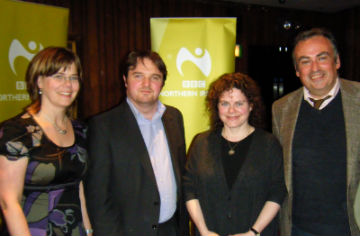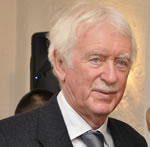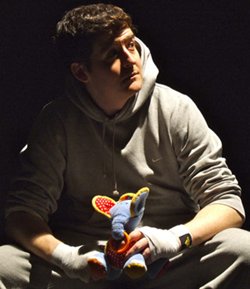‘Absolute delight!’ This was Hanna Slattne’s reaction when she learned that playwrights David Ireland and Jimmy McAleavey, whose work was produced by Tinderbox Theatre Company in Belfast, had won two of the three awards presented by the Stewart Parker Trust in March of this year. The Trust awards three prizes annually: the New Playwright Bursary, the BBC Radio Drama Award and the BBC Irish Language Award. It was the first time ever that playwrights with productions from a single theatre company had won two awards at the same time, with McAleavey winning the New Playwright Bursary and Ireland winning the BBC Radio Drama Award. ‘I was over the moon for David and Jimmy as individual writers and also for us all as a creative team,’ says Slattne, Tinderbox’s literary manager. ‘I hope the writers know how much we love their work, but to get the recognition of the Stewart Parker Trust is very important. It is an award with great integrity.’
 For over two decades the Stewart Parker Trust, named for the late Northern Irish playwright, has been seeking to support new writers both financially and creatively. Stewart Parker’s death from cancer in 1988 cut short the work of an extremely talented writer, but not before he left behind some of Ireland’s most significant plays, including Spokesong (1975) and Pentecost (1987), both remounted by Rough Magic Theatre Company/Lyric Theatre in 2008, directed by his neice Lynne Parker, to mark the 20th anniversary of his death.
For over two decades the Stewart Parker Trust, named for the late Northern Irish playwright, has been seeking to support new writers both financially and creatively. Stewart Parker’s death from cancer in 1988 cut short the work of an extremely talented writer, but not before he left behind some of Ireland’s most significant plays, including Spokesong (1975) and Pentecost (1987), both remounted by Rough Magic Theatre Company/Lyric Theatre in 2008, directed by his neice Lynne Parker, to mark the 20th anniversary of his death.
For honorary director John Fairleigh, the Trust exists both as a commemoration of one of Ireland’s greatest playwrights and as a recognition of the difficulty any writer faces in trying to gain sustained access to the theatre community. Fairleigh recalls how hard it had been initially for Parker to get his work read and produced, a struggle that can be familiar to any playwright trying to break into theatre. The New Playwright Bursary of stg£8,000 provides an emerging playwright, whose had their first professional production, with a modest financial windfall to help them create the time and space to continue writing. Gary Duggan, who won the bursary in 2006, sees the financial aspect of the prize as essential. Winning it gave him ‘the confidence and the financial boost to quit my day job in financial services and make an attempt at writing full time, which I've managed to do for the last five years now.’ Winners of the BBC Radio Drama Award and BBC Irish Language Award also receive bursaries, each worth stg£1000.
 In addition to the bursaries, which receive funding from the BBC and from the Arts Councils on both sides of the border, the Trust hosts an annual residential workshop. Each year, a number of emerging playwrights who have been identified by the Trust, with the help of the Irish Theatre Institute, are invited to participate in a weeklong workshop at the Tyrone Guthrie Centre in Annaghmakerrig, Co. Monaghan. These five to six participants are offered access to Graham Whybrow, former literary manager of the Royal Court, who works with the writers on exploring general principles of playwriting and acts as a one-on-one dramaturgical resource. ‘The idea,’ says Fairleigh, ‘is to be available to the writers and not to have any agenda.’ For participant Amy Conroy, ‘It’s rare to have the time to spend solely on writing. Something always gets in the way: deadlines, dead jobs, dead ends. The time to tease out and pull asunder new ideas, and to explore and push old ones, becomes a luxury.’
In addition to the bursaries, which receive funding from the BBC and from the Arts Councils on both sides of the border, the Trust hosts an annual residential workshop. Each year, a number of emerging playwrights who have been identified by the Trust, with the help of the Irish Theatre Institute, are invited to participate in a weeklong workshop at the Tyrone Guthrie Centre in Annaghmakerrig, Co. Monaghan. These five to six participants are offered access to Graham Whybrow, former literary manager of the Royal Court, who works with the writers on exploring general principles of playwriting and acts as a one-on-one dramaturgical resource. ‘The idea,’ says Fairleigh, ‘is to be available to the writers and not to have any agenda.’ For participant Amy Conroy, ‘It’s rare to have the time to spend solely on writing. Something always gets in the way: deadlines, dead jobs, dead ends. The time to tease out and pull asunder new ideas, and to explore and push old ones, becomes a luxury.’
It can be argued that the access to that kind of time and space should be regarded as a necessity rather than a luxury, and any sustainable contact with a producing organisation is desired if a writer is to feel they’re on the right track. Both Tinderbox and Dublin’s Fishamble: The New Play Company work to create opportunities for writers at several different stages of their development. The idea for Tinderbox, says Slattne, ‘is that there should be a structure which allows for several different routes to build on a writer’s experience and their relationship with us.’ These different routes can include workshops for writers in their teens and early twenties, one-on-one dramaturgical support, or indeed work commissioned for Tinderbox’s main stage.
 For Fishamble literary manager Gavin Kostick, the company’s efforts to develop writers has in turn made it somewhat difficult to produce work they receive through submissions. ‘A lot of the plays came from writers who had worked through a Fishamble playwriting course,’ says Kostick, ‘so that they had a better play to submit — not just to us but to anyone.’ Without access to the appropriate facilities or funding to produce all the scripts of quality that they receive, other ways of extending the company’s support of new work have been found. These include initiatives to commission and produce short work, as well as the establishment of the Fishamble New Writing Award, which is presented during the ABSOLUT Fringe Festival as a way to recognise new writing in a broad sense, from playscripts to devised work to dance. The company has also sought to provide dramaturgical support to companies that want to produce new work but lack the appropriate resources needed to develop it. With financial support from the Arts Council, Fishamble has created the New Play Clinic, which provides a space and dramaturgical support to a new play scheduled for production in winter 2011 or 2012. It’s interesting to note that over the years a great number of Stewart Parker Trust winners have come from small, independent companies like Fishamble and Tinderbox, and for John Fairleigh that isn’t really a surprise. ‘There aren’t many companies in Ireland dedicated to doing new plays,’ says Fairleigh, ‘so naturally the companies that are making it their business, like Tinderbox, Fishamble and Rough Magic, all would be associated disproportionately with the prize. Then you could ask supplementary questions about why that is, and why larger institutions are less represented.’
For Fishamble literary manager Gavin Kostick, the company’s efforts to develop writers has in turn made it somewhat difficult to produce work they receive through submissions. ‘A lot of the plays came from writers who had worked through a Fishamble playwriting course,’ says Kostick, ‘so that they had a better play to submit — not just to us but to anyone.’ Without access to the appropriate facilities or funding to produce all the scripts of quality that they receive, other ways of extending the company’s support of new work have been found. These include initiatives to commission and produce short work, as well as the establishment of the Fishamble New Writing Award, which is presented during the ABSOLUT Fringe Festival as a way to recognise new writing in a broad sense, from playscripts to devised work to dance. The company has also sought to provide dramaturgical support to companies that want to produce new work but lack the appropriate resources needed to develop it. With financial support from the Arts Council, Fishamble has created the New Play Clinic, which provides a space and dramaturgical support to a new play scheduled for production in winter 2011 or 2012. It’s interesting to note that over the years a great number of Stewart Parker Trust winners have come from small, independent companies like Fishamble and Tinderbox, and for John Fairleigh that isn’t really a surprise. ‘There aren’t many companies in Ireland dedicated to doing new plays,’ says Fairleigh, ‘so naturally the companies that are making it their business, like Tinderbox, Fishamble and Rough Magic, all would be associated disproportionately with the prize. Then you could ask supplementary questions about why that is, and why larger institutions are less represented.’
Fairleigh is quick to add that organisations like the ABSOLUT Fringe Festival and the Project Arts Centre have also been crucial in supporting new work for the stage — work that goes beyond purely text-based theatre. Indeed, the idea of new play initiatives should include work that isn’t necessarily coming from a prewritten text but that can be devised, ensemble-led, and performer-centric. ABSOLUT Fringe has been consistently finding ways to create space for theatre artists to develop their work. Their most recent initiative, Show in a Bag, stems from a collaboration between Fishamble, the ABSOLUT Fringe and the Irish Theatre Institute. Show in a Bag takes five performers who each have an idea for a show, but who may feel they don’t have the writing skill or producing savvy to put it on. The performers develop their work with Fishamble’s Gavin Kostick, perform it in a slot at Bewley’s Café Theatre during ABSOLUT Fringe, and are offered resources by the Irish Theatre Institute to help secure a production life beyond that initial performance. Show in a Bag is as much about offering performers creative agency as it is a reaction to the deep funding cuts the sector has experienced. For Fringe artistic director Róise Goan, ‘there was the unrecognised dividend of that funding, which were the actors that were employed, the technicians who were employed, the designers who were employed — no one was really talking about them.’
Besides providing new and exciting work to audiences around the country, the wide-reaching economic benefits of this approach are obvious: performers aren’t just provided with the space to create their own work, but their productions can generate affordable shows for venues around Ireland to programme throughout the year, in turn employing more people to make those shows happen. Jen Coppinger of the Irish Theatre Institute, acknowledges that there has been a great interest from venues in this initiative, and that it can help facilitate their programming: ‘At ITI we’re constantly in contact with venues. There is trust and understanding that has been built up over the years’. And this model has claimed a great deal of success in its inaugural year, the most visible being Fight Night, written by Kostick and performed by Aonghus Óg McAnally. Since its introduction at the ABSOLUT Fringe, the show has had a sellout run in Bewleys, is touring nationally, and will appear as part of the ReViewed showcase during this year’s Ulster Bank Dublin Theatre Festival, with the possibility of touring internationally next year. ‘Clearly, there's no way I could have achieved anything approaching this on my own,’ says Óg McAnally. ‘I've described Show in a Bag as "the stabilisers on the bike" that I needed to jump in at the deep end of making my own work, something I'd been talking about for nearly a decade.’
The Rough Magic SEEDS Programme has also sought to expand the goals of a new play initiative, with a programme that includes training and mentorship for directors, designers, producers as well as playwrights. First established as a way of developing new writing, Rough Magic artistic director Lynne Parker notes that ‘we realised that there was no point in developing new scripts if there was no one to produce them. So we expanded the programme to include directors and subsequently the full spectrum of theatre disciplines.’ The primary aim of the programme is to offer an introduction to professional practice, with participants working on and observing a number of Rough Magic productions. Participants also get opportunities to see work by influential theatre makers in Ireland, as well as the UK and across Europe, giving, as Parker notes, an opportunity ‘to see possibilities in the artform that may not be available here.’ The programme participants’ work is presented as a showcase in association with ABSOLUT Fringe, which this year includes the rehearsed readings of the work of writers Mark Cantan and Shaun Dunne. For Cantan, admittance to the world of professional theatre offered through the SEEDS Programme is a key advantage. Cantan says it’s great to be commissioned, but ‘for me it’s [about] being introduced to the company, the other SEEDS and different people in the theatre community in Ireland. It’s really great to have a place to go and talk and think about theatre. And finally it’s nice to have someone like Rough Magic say, “Y’know, you’re actually okay at this writing thing.”’
While it’s heartening to see the amount of dedication to new plays across the sector, John Fairleigh cautions that offering only initiatives could create a cul de sac for new writers, who may feel the benefits of mentorship, but ultimately find themselves stuck in a development limbo. The greatest education for a writer is to see how their work behaves in the crucible of production. While initiatives like Show in a Bag are great ways of generating new, touring-friendly productions, initiatives geared specifically for writers should aim to develop their work through productions as well as workshops. ‘I think there’s a much broader problem in the way in which we support writers,’ says Fairleigh, ‘and that is we don’t have enough productions. I think the real danger is that we’re developing our business of identifying writers, helping writers, having workshops for writers, and then that’s it — there isn’t a proper flow through to production.’
Jesse Weaver has recently been awarded a PhD in Theatre Studies from UCC, and is a playwright.